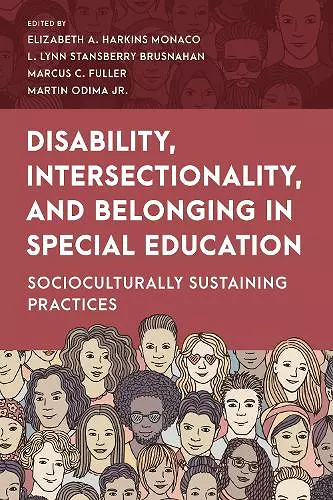Disability, Intersectionality, and Belonging in Special Education
Socioculturally Sustaining Practices
Elizabeth A Harkins Monaco author L Lynn Stansberry Brusnahan author Marcus C Fuller author Martin O Odima, Jr author
Format:Paperback
Publisher:Rowman & Littlefield
Published:21st Feb '24
Currently unavailable, our supplier has not provided us a restock date

This book focuses on preparing culturally competent educators who use culturally sustaining practices and culturally relevant curricula and instruction to reach and teach all students with disabilities, including those with multiple social identities, through a varied multi-cultural lens.
Today’s diverse classrooms require that educators possess competencies for teaching all students. This book has two primary audiences:
1. Pre-service educators
2. Special education practitioners and administrators
First, this book will assist pre-service students learning about special education for students with disabilities. We fully expect this book could be a required reading for students majoring in special education, for school social work students, for school counselors, and for students majoring in vocational rehabilitation services as a part of their coursework for transition.
Second, this book will assist special education practitioners and administrators to meet the needs of individuals with disabilities including those with multiple social identities. Understanding the full-range of needs relating to cultural sustaining practices is imperative to working with individuals with disabilities and their families and care-givers. Being able to understand and explain this complex issue to others is important and often very necessary.
This book is incredibly timely. Recent contributors to social injustices are the COVID-19 pandemic and the continued issues around police brutality and people of color. Social injustice in special education is historical and systemic. Special education practitioners are typically unaware of the importance of intersectional differences (Gay & Howard, 2000; Owen, 2010). Historically, practitioners have only been prepared to address cultural perspectives during awareness days and or through specific units in curricula. Other times they discuss it diagnostically (Linton, 1998), such as part of an educational plan or a need to learn English as a second language.
Other issues stem from the value system of the special education practitioners themselves; some are not willing to engage in these concepts (Darling-Hammond, 2002); some “define fairness and equity as treating all children the same; and [others identify being] ‘colorblind’ [as] valuing diversity” (Owen, 2010, p. 18). Even when special educator practitioners attempt to address injustices on behalf of their students, they tend to center only on the student’s disability which means they are ignoring or erasing other aspects of their students’ identities.
These issues highlight the importance of building the cultural competence of our teaching...
ISBN: 9781538175828
Dimensions: 229mm x 152mm x 30mm
Weight: 599g
450 pages